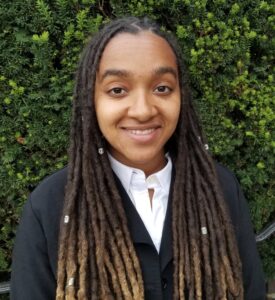As an adolescent in Philadelphia, Pennsylvania, Maya Bracy credited her grandmother, parents, and other caregivers with fostering resilience in her life. Now, as an incoming Ph.D. student in the School of Education, Bracy hopes to illuminate ways in which communities can support infants and young children to cultivate protective factors when faced with adversity.

An alum of Williams College, where she received a degree in psychology with a concentration in Africana studies, Bracy has enrolled in the school’s Applied Developmental Science and Special Education program.
“I was really interested in the interdisciplinary work that my advisors do,” Bracy said. “That led my search for graduate programs.”
At the School of Education, Bracy hopes to continue research as to how communities can provide social and emotional support for young children who are already exposed to environments that are uncertain or involve trauma—as those are predictors that put them at higher risk for developing maladaptive emotion regulation behaviors.
“When you are set up with tools and a strong foundation, it creates more resilience through adversity,” Bracy said. “My ultimate interest is in what are these specific protective factors or foundations that you could give to children in these situations?”
For the past two years, Bracy has worked as a faculty research assistant at the University of Maryland and at the National Institute of Mental Health collecting newborn, infant, and toddler behavioral and neurological data on a project aimed at identifying early predictors of anxiety.
“In Philadelphia, on your block or in your neighborhood there are leaders who are self-appointed, who care and show up,” Bracy said. “Once we’re more focused on plugging into the community and involving them in the research process, then I imagine the communities will thrive.”
Bracy is a Weiss Urban Livability Program fellow, an initiative of The Graduate School that supports students who have an interest in urban livability.
“Ultimately, the urban livability part was the fact that I really want to return the focus of the research back to the community,” Bracy said. “In research or academia, we tend to get away from this idea that communities know exactly what they need.”
She said she’s grateful for the opportunity to join other Weiss fellows this academic year, especially as a first-generation graduate student.
“I’m farther away from my own support system; this fellowship is giving me more people to be in community with on campus,” Bracy said.
Bracy hopes to continue her research to better understand the relationships between parents and children, particularly in lower-income communities or communities of racial or ethnic minority.
“All of these significant relationships in my life gave me tools and supplemented the tools that my parents also gave me,” Bracy said. “My goal is learning more about the surrounding communities and how they can empower themselves.”
